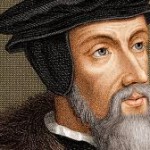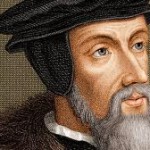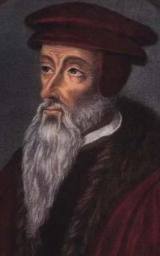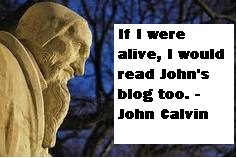 This article was first published in the Reformed Quarterly Magazine Fall 2001.
This article was first published in the Reformed Quarterly Magazine Fall 2001.
Calvin the Evangelist. Original source here:
There are many popular misconceptions about John Calvin. Who is the true Calvin behind the image?
Will Durant, the famous author of the eleven-volume series on the History of Western Civilization, said of Calvin: “We shall always find it hard to love the man, John Calvin, who darkened the human soul with the most absurd and blasphemous conception of God in all the long and honored history of nonsense.” Even the defrocked TV evangelist, Jimmy Swaggart, has something to say about Calvin. “Calvin,” said Swaggart,” has caused untold millions of souls to be damned.” Such judgments, besides being uncharitable, fail to get at the real John Calvin – a man with a strong evangelical heart.
One of the most pervasive criticisms of Calvin is that he had no interest in missions. The well-known Protestant missiologist, Gustav Warneck, portrayed the Reformers, including Calvin, as missiologically challenged merely because they believed in predestination. “We miss in the Reformers, not only missionary action, but even the idea of missions… because fundamental theological views hindered them from giving their activity and even their thoughts a missionary direction.”
But history tells another story.
The city of Geneva, long associated with Calvin, was also an important refugee center in the Reformer’s day. Throughout sixteenth century Europe, persecuted Protestants fled their homelands, many of whom found their way to Geneva. In the 1550s, the population of Geneva literally doubled.
One of those refugees who came to Geneva was the Englishman John Bale, who wrote: “Geneva seems to me to be the wonderful miracle of the whole world. For so many from all countries come here, as it were, to a sanctuary. Is it not wonderful that Spaniards, Italians, Scots, Englishmen, Frenchmen, Germans, disagreeing in manners, speech, and apparel, should live so lovingly and friendly, and dwell together like a … Christian congregation?”
Since Geneva was French-speaking, the vast majority of refugees came from France. As they sat under Calvin’s teaching in the Cathedral of St. Pierre, the French refugees’ hearts stirred for their homeland. Many of them felt compelled to return to France with the Protestant gospel.
Calvin, however, did not want to send uneducated missionaries back to the dangers of Catholic France. He believed that a good missionary had to be a good theologian first. And so he inspired and educated them. He trained them theologically, tested their preaching ability, and carefully scrutinized their moral character. Calvin and the Genevan Consistory sent properly trained missionaries back to France to share the Gospel.
Calvin did not just educate them and send men back to France. These missionaries did not just become photographic memories on Calvin’s refrigerator door. On the contrary; Calvin remained intimately involved in all that they were doing.
The Genevan archives hold hundreds of letters containing Calvin’s pastoral and practical advice on establishing underground churches. He did not just send missionaries; he invested himself in long-term relationships with them.
Concrete information exists from the year 1555 onwards. The data indicate that by 1555, there were five underground Protestant churches in France. By 1559, the number of these Protestant churches jumped to more than one hundred. And scholars estimate that by 1562 there were more than 2,150 churches established in France with approximately three-million Protestant souls in attendance.
This can only be described as an explosion of missionary activity; detonated in large part by the Genevan Consistory and other Swiss Protestant cities. Far from being disinterested in missions, history shows that Calvin was enraptured by it. Continue reading →







